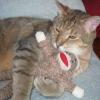Search the Community
Showing results for 'calories'.
Found 17,501 results
-


Help me get back on track!
qianmij replied to krystel's topic in POST-Operation Weight Loss Surgery Q&A
How's your calorie intake? Your water intake? Vitamins? -
What are the best foods to graze on? Sometimes I get hungry between my 3 hour meal times. That is to say, I eat every 3 hours. Sometimes I will have a chicken meatball, a few edemame or some seaweed wafers. These do not seem too bad. What suggestions do you have? Please don't tell me not to graze because I am already aware that it is a no no for us. I eat about 1000 calories a day and usually exercise hard, about 700-900 calories over an hour by running, ellyptical or strength training. I do not graze every day and when I do it is usually only once or twice during the day.
-


two month follow up today
Shellbell333 replied to tigerbelle's topic in POST-Operation Weight Loss Surgery Q&A
I enjoyed the info. I'm like you and expect/ WANT to see more weight loss in 2 months........BUT, I really think it will stay off if it comes off slower. Some of your info surprised me like the protein and fluids numbers thats good for him. All n all, you're doing great. Loss and not gain is alway good. Do you know how many calories you are getting? If you are eating less than 500cals still, your body may be holding on to the fat thinking you are starving it. One post I looked at today said they increased there cal intake just a little and dropped 5 pounds in 1 week. The body.....a strange thing. GOOD LUCK -


First week & Second week
triplethreat replied to madisunshine1's topic in POST-Operation Weight Loss Surgery Q&A
My plan was different, I was only on clear liquids one day after surgery then went to full liquids for two weeks. I only had Protein shakes and Water. I'm in week 1 of soft foods which is a 2 week phase. I eat scrambled egg, cottage cheese, puréed foods, Greek yogurt, shredded soft cheese, Soup, etc. My team doesn't want me to worry about fat content or calories for the first two months-- just focus on liquids and protein. Sent from my iPhone using the BariatricPal App -
Doing exactly what my doctor told me to do! Exercise, take my Vitamins, and walk about 28 miles a week in which I've turned that into running! But i started with putting the treadmill at the highest incline it will go and the speed at 4.0.You burn three times the calories doing this.In an hour i would burn around 1200-1400 calories.
-


Good Sources of Carbs
Arabesque replied to GummyBearQueen's topic in POST-Operation Weight Loss Surgery Q&A
I wouldn’t worry too much about carbs at this point. Protein, protein, protein now. Wait until you’re on more solid food & eating a little more. Generally 100g of carbs provides about 400 calories. 100g of protein provides about the same number of calories. That’s a hell of a lot considering the stage your at, the portion size you can consume & that your diet should be predominately protein at the moment. Maybe the less than 100g was something to work towards as you progress??? Also, carbs can be a bit heavy on your healing tummy. But of course everyone is different you may be able to tolerate them earlier. You need to look for whole grains & multi grains but don’t forget you’ll get a lot of good carbs from fruit & vegetables plus a lot of other nutrients. Lentils, barley, beans are easy to throw into soups, stews, etc. or cook them up, throw in some herbs & spices & they can be a yummy side as well. And of course I love my milky rolled oats. Congrats on your surgery. -


Vegetarian/Vegan After Sleeve
JerseyCityGal replied to VonJuke's topic in POST-Operation Weight Loss Surgery Q&A
Oh, and I have no trouble at all getting my Protein in. Today so far I've had 735 calories; 43 carbs and 85 grams of protein. dinner is going to be really light, probably some Tofurkey slices for 100 more calories; 6 carbs and 13 more grams of protein. -


Diets tried roll call!
SkinnyScrapper replied to Reigo's topic in POST-Operation Weight Loss Surgery Q&A
I never had to do these silly diets before (no offense), but once I was over 40 I could just not drop the weight by counting calories alone. I had a long checklist on my shrink eval: eDiets Revival soy bars Sensa Green coffee Bean capsules Full Bar,. Full Bar Gummies, Full Bar gum -
'Consumed most calories at night'
-
I'm 4 weeks post RNY today. As above if unsure ask your dietitian or doctor, but some ideas: I'd say log your food and fluid intake to make sure you're taking in enough fluid and so that you know what your calorie intake is. My dietitian told me about a patient who had complained he wasn't losing weight during the liquid part of the diet and when she delved into it, he was liquidising mars bars. I doubt you're doing this but always worth recording your intake I'd say? I've always been told by doctors that building muscle can add weight (or mean that you don't lose weight), so maybe your exercise regime is building muscle at the expense of a weight loss? I haven't experienced a stall (yet!) but many people say they do have this at about 3 weeks? Only other things I can think of would be constipation or fluid retention? Good luck!
-


The ?Marathon? Journey of Weight Loss Surgery
Warren L. Huberman PhD. posted a topic in LAP-BAND Surgery Forums
I’m a runner. I’ve been a runner since I was a teenager. I’ve run five or more miles three times a week for the past four years and rarely take a day off. Many of my runs have been over ten miles. I’m the crazy guy you’ve seen running in the rain and the snow on the side of the road at 7 AM. I’ve learned a lot from running and many of those lessons I have applied to life in general. I’ve shared much of what I’ve learned about running with many of my patients because I believe that there are a number of parallels between long-distance running and the journey through weight loss. Many of my patients agree. I’d like to share some of these parallels with you to provide you with a helpful way to think about all that you’ve gone through and may still experience going forward. I should make an admission to you first. I’ve never actually run a marathon. It’s something I very much want to do someday but have yet to attempt because of some nagging injuries and such. However, I know enough about long-distance running and have spoken to enough marathon runners to understand the psyche of the marathon runner. Therefore, I feel comfortable speaking of it here. Consider the entire journey of weight loss surgery from before surgery to years afterwards as a marathon. For those of you who are unfamiliar, a marathon is a race of 26.2 miles. The modern Marathon commemorates the run of the soldier Pheidippides from a battlefield at the site of the town of Marathon, Greece, 26.2 miles to Athens in 490 B.C. It is seen by many as the ultimate test of endurance (although there are now ultra-marathons that can go for 100 miles or more!). There are many things one must do to prepare for the running of a marathon. A marathoner has to complete several practice runs and work up his stamina and endurance to get into peak physical condition for the race. A marathoner is encouraged to make dietary changes, especially in the few days before the race. A marathoner has to mentally prepare for the grueling 26.2 run and plot out the course and a strategy of how he is going to make it from start to finish. The process of weight loss surgery is quite similar. There are many steps to take before your big day. There is research to do. Perhaps you will talk to doctors or to those who have had surgery to better understand what you will be experiencing. When you decide that surgery is for you, there are pre-surgical assessments, medical tests and other things that must be done to ensure that you are prepared for what lies ahead. You are instructed to make dietary changes in anticipation of your surgery…perhaps a liquid diet for a week or more. And certainly you must mentally prepare for all of the physical, behavioral and emotional changes that lie ahead. For the most part, your surgery date is the starting line. You’re nervous. You’re excited. You’re hopeful. Similarly, the marathoner heart is pounding long before the starting gun is fired. The gun is fired and suddenly…they’re off! The first few days after surgery, you’re just trying to do as told. Listen to what the surgeon, the nurses and other professionals’ tell you and get home from the hospital as soon as you can. The marathoner is just putting one foot in front of the other and trying to find a good pace…a comfortable groove. Nothing fancy, just moving ahead. The first few weeks after surgery are like the marathoners first few miles…nice and easy. Learning to chew, learning what to eat and what not to eat…adjusting to the new pace of eating and making other changes in your life to improve your chances of success. Much of the journey lies ahead and thinking too far ahead can be daunting. Keep your head in the present. At some point, there will be bumps in the road. The runner may have a side-stitch, a cramp, pain, fatigue, a pebble in his shoes; some complications to be addressed. The marathoner understands that some of these discomforts will come and go. Sometimes, if you just let it be and shift your focus to other aspects of the running experience and away from the discomfort…the discomfort goes away. It is important that the marathoner not panic about the situation. The journey through weight loss surgery will also have its discomforts. Like the marathon, many will simply come and go. Some days may be more difficult than others. On some days eating may be more difficult than other days. On some days, cravings will seem stronger than others. In most instances, the discomfort will be temporary. Avoiding “catastrophic” thinking is the key. I am speaking of the mental demons that we all must deal with. Often while running, it seems as if a little devil appears on my shoulder whispering negative comments in my ear. “You’re never going to make it.” “You can’t do it.” “What were you thinking trying to run so far!?” “You’re not into it today…just go home and try again tomorrow.” Weight loss surgery patients also hear the voice of a little devil who attempts to derail you. “How am I going to avoid eating some of those foods that I love?” “What am I going to do at the holiday barbeque…I’m going to go nuts!” “I can buy a pint of ice cream and just have a little…what’s the big deal.” “A few cookies couldn’t hurt.” Part of your preparation for the marathon of weight loss surgery needs to include maintaining a positive attitude that can help you last the equivalent of 26.2 miles and to develop strategies for coping with these mental “cramps” and “side-stitches.” What am I going to tell myself when and if things get a bit complicated? What you tell yourself is immensely important in determining how and whether you will reach the finish line. Believing that you can cope with some of the temporary and unpleasant bumps in the road is essential for your success. Many of my patients initially get quite deflated by setbacks or slips. Most times, they are engaging in what I call “black and white thinking.” In this way of thinking, eating one serving of ice cream immediately becomes “I’m sabotaging my surgery!!” One day of feeling deprived or hungry becomes “My band isn’t working!” or “I’m never going to be able to live this way!” It is dramatic, exaggerated and self-defeating thinking. The marathoner’s mindset needs to be focused on “how I can” not “why I can’t.” There is nothing propelling the marathoner forward other than his or her own desire to persevere. He can stop with one step, but CHOOSES not to. He tolerates the discomfort. You also can stop. You can “cheat.” You can avoid getting your band adjusted. You can eat around the bypass. You can drink your calories. You can eat sweets. But you won’t finish the race and you’ll feel terrible for it. Several miles further down the road, the marathon becomes a strange combination of harder and easier. The marathoner has plenty of discomfort. Discomfort is probably an understatement. His body aches, his feet burn and his mind is often numb…but at the same time, he is beginning to almost taste the finish line. There are fewer miles ahead than behind. There is a mild euphoria as he considers that he might actually make it!! The surgery patient has lost a lot of weight several “miles” into her race. Perhaps most of the weight has already been lost…or maybe it’s already all off and now she’s focused on keeping it that way. But perhaps there are still some discomforts. Maybe some people continue to make annoying comments, or you have some body image concerns, or are experiencing other sources of anxiety and insecurity. It will be ok. Keep the focus on the here and now, avoid catastrophic thinking, and address what needs to be addressed. Try to taste the finish line. It’s not much farther now. This is where the analogy ends. The marathoner raises his arms as he crosses the finishing line and gasps in a combination of exhaustion and euphoria….I did it!! It is an incredible accomplishment. He is finished. But as a person who has had weight loss surgery, you will always be running your race. Through time, your pace will hopefully become more predictable and steady, but the journey of weight loss surgery never truly ends. There are always “side-stitches” and “cramps” and little “pebbles in your shoes.” Rub out the cramps. Take a few breaths to relieve the side-stitches. Step off the track for a moment and shake out the pebbles in your shoe. Focus away from whatever the source of discomfort. There’s no timer anymore so there’s no rush to the finish line. Take each day as it comes, some better than others. Just keep a steady pace, a clear focus, and a positive attitude and you will successfully cross a thousand finish lines. Important lessons to remember: · Stay focused in the present. Avoid thinking of how far you still have to go. Instead, focus on how far you’ve come. You cannot effect change in any moment other than the present one, so thinking about and certainly worrying about the future is in many ways both pointless and counterproductive. It only creates anxiety and ruins the present moment. By focusing in the present, you will get to the future faster than you think. When I run, if I focus on the fact that 90% of the distance lies ahead, I immediately feel tired and overwhelmed. When I simply take it one step at a time and enjoy the run, by the time I next think about my distance I’m that much further along and confident that I’ll get through it. · Keep your “qi” (pronounced “chee”) about you. Qi is the circulating life energy that in Chinese philosophy is thought to be inherent and flowing in all things (it’s like “the force” in Star Wars). I think of qi as being a peacefulness, and being at one with the world around me. When I run, I feel more alive than at any other time. I am at one with the world around me. I am moving through the world and feel the world moving through me. Live in the current moment and allow yourself to experience all that you are experiencing. Be present in the present. Avoid thinking of what is wrong or what could go wrong. Instead focus on what is wonderful right now. · Most of the physical and emotional discomforts that you will experience on your journey will come and go. Maybe not right away or even today. But most discomforts do not last forever. Just as many of the runner’s side-stitches and cramps work themselves through, so will yours. · Avoid focusing on small and meaningless detail. Don’t weigh yourself incessantly and get down on yourself for every calorie. Do not become overly disappointed if you do not achieve these silly and arbitrary goals. The marathoner can choose to obsess about his slightly slow pace and tragically turn a remarkable event into an unbearable trek. · Believe that you can “stand” some discomfort. Telling yourself “I can’t stand it” will lead you to not stand it. The marathoner perseveres through extraordinary physical and psychological challenges to reach the finish line. It is not an easy path. Your path too will be littered with obstacles. Trust in yourself and believe that you “can stand it” as well. · Focus on the journey and the big picture. The transformation. The accomplishment of weight loss surgery is not in losing a certain amount of weight. It is about being able to make positive, meaningful change in your life that is now possible at this lower weight. Success isn’t achieved through a number on a scale; it’s by being able to live the life you’ve always dreamed of. · Enjoy the run, not just crossing the finish line. In every moment of the race and in every moment of your journey…take a look around. Breathe in what is beautiful and enjoy each moment. Don’t live your life only in anticipation of crossing the finish line. When you have reached the finish line, I promise you that you will look back and think very fondly of the race you’ve run. :thumbup: -
On another side of this quandary, you may well find your list of 'old favorite foods' undergoes a severe reorganization. One of my favorites, Pasta w/various sauces, is relegated to the bottom of the list. In fact almost any food with added sauces simply are undesirable these days. It was a tremendous discovery, to suddenly realize that so much of what I thought I liked, was the result of clever sauces and unhealthy gooey stuff added to make what I otherwise didn't care to eat, appear to be palatable. There's lots of calories in sauces, and 'ketchup/catsup' is largely high fructose corn syrup....which simply fires my system into high-food-lust mode regardless of hunger/satiety/nutritional need or rational explanations. The first time you get really 'stuck' the obvious remedy of changing that 'eating fast' habit will undergo its own transformation. In my own transition-to-solids phase, I discovered the pleasures of nib-nib-nibbling a soda cracker in such a way it to literally 5 minutes to consume it. Other changes will become obvious: gulping fluids to wash down globs of non-chewed stuff to make way for more was a startling change: I took easily to no-fluids-with-meals. Another Big Change...was to learn to enjoy DINING rather than focus of EATING. The re-adaptation and recognition that 'social events' are accompanied by dining, rather than 'over eating justified by a bunch of people' milling around under some pretext. Maybe it's just me.
-
It makes sense, but it doesn't work that way, actually. You need to consume a certain amount of calories for your body to produce enough energy to burn fat. Also if your calorie intake is too low it will put your body into starvation mode, which will make it preserve fat. So I know it sounds kinda messed up, but consuming more calories (or more accurately, the correct range of calories) will make you lose MORE weight.
-


I stop losing wieght
LipstickLady replied to nermine.b's topic in POST-Operation Weight Loss Surgery Q&A
Just keep getting in your protein and you liquids, move your body and stick to your fat/calories/carbs as outlined by your doctor. The weight WILL come off. I stalled for 30 days and it was frustrating, but I was losing inches even though the scale wasn't moving. If you stick to plan, you will lose. -
You might be too tight and have soft food syndrome. When you can drink your calories you might be shocked at how many calories you are actually consuming. Have you tracked EVERY single thing that goes in your mouth on Calorie Counter, Diet Tracking, Food Journal, Nutrition Facts at The Daily Plate or another good site is FitDay - Free Weight Loss and Diet Journal. Both are free and both show you what you are actually consuming in calories. I'd guess that 99% of people are shocked at what they consume. Perhaps a bit of an unfill is in order?
-
I asked at my NUT mtg on Monday & she said I should be getting 800-1200 calories. Lol I laughed & asked her if she meant @ 1 yr post-op. She said by summer. I laughed again & just said ok. I'm on purees now & lucky to hit 400.
-


Queasy and Exhausted!
JamieLogical replied to Stephanie Voss's topic in POST-Operation Weight Loss Surgery Q&A
Did you increase your calorie intake to compensate for your increased activity? Could be you aren't eating enough. Similarly, if you are heavy on the cardio, you will need more water than you were drinking before. -


Tackling Emotional Eating by Shifting Out of ?Autopilot?
Warren L. Huberman PhD. posted a topic in LAP-BAND Surgery Forums
Perhaps no topic in the area of weight loss and weight loss surgery receives as much attention as “emotional eating.” Hundreds of articles and books are written on this topic every year appearing in magazines, newspapers, websites and other media sources. But what exactly is emotional eating and why does it receive so much attention? Emotional Eating Defined The term “emotional eating” is in many respects a “garbage-pail term” that is often used to refer to any form of eating that is not purely hunger-based. Most discussions on emotional eating also explain it as a behavior that one should make every effort to minimize, if not terminate completely. However, the irony is that everyone is an emotional eater to some degree and life would be quite joyless if all forms of emotional eating were to be eliminated. Fortunately, this is not necessary. Most folks seem to make a distinction between two types of emotional eating: eating in response to positive emotions and eating in response to negative emotions. Positive emotions are desirable or pleasant such as happiness. This form of emotional eating often relates to celebrations or accomplishments. In this way, holiday meals are a form of positive emotional eating as is going out to dinner to Celebrate a promotion at work. Negative emotions are unpleasant and are generally seen as undesirable. Eating in response to negative emotions is often a way of attempting to provide oneself with comfort. Eating when you are depressed or lonely or nervous are examples of eating in response to negative emotions. In general, eating in response to negative emotions is the type of emotional eating most folks view as being more problematic as the former seems to be almost an inherent part of every culture on the face of the earth. As an example, one of my former patients, a rabbi, jokingly describes the three characteristics of a Jewish holiday as: “they tried to wipe us out, God saved us, let’s eat!” I’m not suggesting that there is no benefit in addressing eating in response to positive emotions; however this is not the focus of the current discussion. So let’s focus on eating in response to negative emotions and to simplify our discussion, simply refer to this as “emotional eating.” One interesting aspect about folks who describe themselves as “emotional eaters” is that in my experience the behavior is often described as being non-conscious or out of their awareness. I refer this state as being on “autopilot,” similar to a plane that is flying itself without a pilot making active decisions as to where the plane should be going. Here’s why. Very rarely do patients describe incidents when they would feel an unpleasant emotion and then consciously decide to immediately march to the refrigerator or corner Quick-mart for a snack. Emotional eating is far more subtle than that. Much more common is that the person recalls a situation when they were surveying the contents of their cabinets or refrigerator and doesn’t even know why they’re there. Some folks go so far as to recall times when they were halfway through eating a bag of corn chips and they don’t even recall eating the first half. They were on autopilot. How does this happen and what can you do to stop it? The Evolution of Eating on Autopilot Consider that eating is almost an automated behavior in that you can do it without paying attention. Walking is much the same way. Initially, when you first learn to eat or walk as an infant, you need to pay attention to learn the skill. Watch any infant taking her first few steps and you will see the focus and determination she has to stay upright and not to fall. She’s really concentrating on what she’s doing. Similarly, when feeding babies with solid food for the first time, we cut up the food very small and feed the baby very small bites because we recognize that eating solid food is a skill that babies do not yet have. We make the decisions on food types and sizes at this stage because we don’t want them to choke. However, in very little time, both eating and walking become activities humans can do with almost no effort. Think about this for a moment. Now, as an adult, when you walk, do you actually think about which leg to move next or do you just seem to go? You can walk a mile without once thinking about your legs or feet for even one second. There’s no thought at all…you’re on autopilot. When you eat it’s the same story. Most adults don’t think about chewing. They can hold a conversation with five people and wipe out an entire plate of food without ever paying attention to their chewing at all. If you’ve had weight loss surgery, you know just how powerful this “eating autopilot” can be because you’ve had to relearn a lifetime of eating behavior that no longer works. After surgery, you had to learn to pay attention and chew more, eat slower, avoid drinking while you eat, etc. These behavior changes probably took awhile to master. In fact, many of my patients who’ve had gastric banding, for example, commented that relearning how to eat was the most difficult part following their surgery. Now let’s turn back to emotional eating. Many of you can recall experiences from childhood where food was given to you as a reward for good behavior or withheld from you for unwanted behavior. Similarly, you may have been offered food to make you feel better when you were disappointed, sad or experiencing some other unpleasant emotion. Almost immediately food and eating was linked to emotions. My grandmother was convinced that chicken Soup could cure anything! And you know what…she was right! It doesn’t take a rocket scientist to recognize that you do feel a bit better while you eat chocolate or nacho chips or whatever your favorite food is. Even folks that didn’t have food thrust upon them to help them cope with negative emotions as children can often recall picking it up themselves later as adults. It seems very easy for humans to learn to eat as a means of coping with emotional upset. Let’s face it…for most of us, eating feels good. Whether it’s the taste or the emotional associations we make with certain foods (comfort foods) or certain people (grandma) or purely a neurochemical affect (serotonin, etc) eating feels good. Unfortunately, what you also probably know is that if you are eating ice cream at night because you are feeling lonely and sad, while you might feel a little sense of pleasure from the ice cream, it does nothing to address the loneliness and sadness and it does wreak havoc on your waistline. Even though it doesn’t really help us cope with emotional upset in the long run, we keep on doing it because it feels good immediately and the consequences of emotional eating are generally delayed, if only by a few minutes. What happened is that over a period of many years, you “learned,” that food has, or is believed to have, the ability to minimize or eliminate your emotional distress. Now, when those feelings arise, you feel compelled to eat as if you’re automatically programmed to do so without even being aware. You’re now running on autopilot. When asked to describe the feelings they have just before eating, many of my patients describe feeling bored or calling it “blaaaaah” referring to some vague, negative emotional state. So if you’re an emotional eater as I’ve described, and you’ve put on a lot of weight as a result, you are not stupid, you are not lazy, you are not pathetic…you are human. Most important for you to understand, you are most certainly not helpless. You need to fix your hard drive and get you out of autopilot by unlearning some ingrained, overlearned maladaptive behaviors in favor of some new more adaptive ones. Shifting out of Autopilot “Recognizing that you have a problem is half the battle!” No it isn’t. That sounds good when people say it but if it were true then being aware that you were 100 pounds overweight would immediately result in a 50 pound weight loss! Not so simple. What this expression means is that if you don’t become aware that you have a problem you can’t possibly do anything to remedy the problem. You must first be aware that this pattern exists in order for you to change it. There is a simple process that you can follow to help make changes in your behavior: Stop→Breathe→Reflect→Choose→Evaluate Let’s go through this one step at a time: 1. Stop! When you’re about to put food in your mouth, stop what you’re doing. It may sound easy but this is clearly the most difficult step. It’s hard to stop engaging in a behavior that you can do without a single thought. Eating is a mindless behavior. As I said earlier, you don’t have to think in order to eat any more than you have to think in order to walk. Hence the autopilot problem. The trick is to develop an improved awareness of your behavior. How can you learn to be more aware? One of my favorite techniques is to put written reminders all over the place. Putting them where you eat is a good idea but other places are great as well. You’re trying to bake this awareness into your brain and knock your brain out of autopilot. Stick those colorful sticky square notes on your bathroom mirror to remind you first thing in the morning to change how you eat. They can say “Be aware of your eating” or even just “STOP!” You’ll remember what it means. Put another note on your rearview mirror in your car. Put another one on your computer screen. Put another one on your refrigerator. Sounds a bit nutty, but if you are truly committed to change you need to remind yourself to do it, otherwise autopilot will rule the day! Just like a computer that has default, automatic settings, so does your brain. Unfortunately, for many of us eating has become the default setting, so without the reminder NOT to eat, eating occurs almost automatically. Another recommendation is that you write down what you eat by keeping a food diary. I know, you’re sighing because you’ve heard this before and you hate this. However, the truth is that when you get into the habit of writing down what you eat, it definitely affects what you choose to put in your mouth. This is why you probably hate writing it down…because it works! After a few weeks of monitoring what you eat your eating habits will change. You will become more “mindful” of the entire practice of eating and will therefore be in a much greater position to change your behavior and CHOOSE to eat differently. Another idea is to put a message of some kind reminding you to eat differently in your schedule book or on your screen saver or on your PDA devise or anywhere that you look numerous times per day. On many occasions, I have written a phrase such as “focus on food” in my schedule book because I look at this book at least 25 times per day. With all of these tactics, and I encourage you to think of your own, the effort is to force your brain to focus on what is going on at this very moment rather than reverting back to old habits we are calling autopilot. 2. Breathe. The idea here is to create a natural pause and to gather yourself and your thoughts. Take a minute and stop what you’re doing and be mindful that you are about to make a change. Breathing helps us relax and makes it easier to focus on your thoughts and block out the world around you. When you find yourself holding open the doors of your cabinet searching for a snack…STOP! and then take a few breaths to gather your thoughts so that you can better decide what you really want to do. The breathing and the few second pause give you a space to slow the wheels down and make small but meaningful changes in your behavior. 3. Reflect. Reflect is a nice way of saying “think.” Now that you’ve stopped and taken a few breaths, think about what you’re about to do. You’re about to eat. Ask yourself a few questions and write them down because they’re going to be the same questions every time and it would be helpful for you to become familiar with the answers: · Am I really hungry? · Do I really want to eat this? · Why am I choosing to eat at this particular moment…what’s going on? · What is the purpose of my eating? · Will eating help my problem beyond making me feel good for 37 seconds? · If I do eat, how am I going to feel after those first 37 seconds? · What is the real issue that I’m using food to try and medicate away? · What is (are) the particular emotion that I’m feeling? · What else can I do other than eat that actually may address the real problem? This step is very important because it can help you understand the reason(s) that you are eating. As we said, eating is your autopilot or your default behavior. If you can learn to stop and think about what’s going on, there will be times that you recognize that your decision to eat was not random. At other times it will be simply because you were truly in the mood for a chocolate bar…and that’s ok from time to time. 4. Choose. The last bullet point above asks “What else can I do other than eat that actually may address the real problem.” This is the key to the whole process. This involves choosing alternative behaviors rather than eating that actually addresses the emotional distress that is leading you to eat. This is where actual change occurs. By choosing an alternative behavior you are actively shifting out of autopilot and proving to yourself that you are capable of making change and that you are not a drone who must obey the urge to eat. I strongly recommend that one of your alternative behaviors be contemplation and journaling. It’s great to develop alternatives to eating, but even better to gain a more thorough understanding of WHY you feel the need to do anything at all. One could make the argument that simply choosing an alternative to eating without becoming aware of why you need to do anything at all is just running away from your discomfort. For example, exercising instead of eating might be good for your health, but it doesn’t go any further in terms of helping you understand what’s causing your emotional upset and how to address it. I’m not suggesting that you need to make yourself miserable, but it is important that you learn what is creating your discomfort. It is also essential to learn that you can tolerate emotional discomfort which I discussed in my previous article on willpower. Seeking professional help or group support is definitely worth consideration if you are struggling on your own. Whatever new strategies you employ, you must practice your strategies every day. Your emotional eating autopilot evolved over a series of years and is quite ingrained. New strategies are going to take a while to take hold and become second nature. Keep the log of your eating long after you think it’s necessary. Keep the sticky square notes around for awhile. It’s important to know that you are going to have setbacks when you resort to emotional eating. Every battle will not be a victory. When these setbacks occur, don’t “catastrophize.” As I said in a previous article, it’s important that you not categorize everything into good or bad, pass or fail. Stop being critical and demeaning of your shortcomings and missteps. If you have a bad day at the Chinese buffet, it’s just one high-calorie meal. It doesn’t mean a thing…unless you tell yourself it does. If you tell yourself it’s a bad day, it becomes a bad day. Tell yourself that your Chinese meal ruined the weekend and you’ve ruined the weekend. Suddenly you’re telling yourself that Friday is a wash and that you might as well give yourself the weekend to have some fun promising that you’ll get back on track on Monday, only Monday never comes. How you think is everything. 5. Evaluate. Did your choice of strategy help? Were you able to close the cabinet and go back to the couch without a snack? Were you able to diminish your emotional upset some other way with some effectiveness? These are the questions you need to ask to implement the new changes. It is very unlikely that you’ll find one strategy that works all the time. Calling a friend might help some times, while taking a walk might help at others. Keep track of which strategies are helpful and under which circumstances so you can develop a whole toolbox of ways to combat emotional eating and better take care of yourself. Going Forward Most of the people that I have known who seem to have won the battle with emotional eating will admit that they’re still fighting the fight even years later. Although their new habits are strong and the old pattern of emotional eating seems to be gone, they still show up from time to time. I think about all of the people who told me how well they were doing on their diets and on their eating behavior change plans prior to 9/11/01 who recalled the whole thing seeming to unwind overnight in the face of such an incredibly stressful event. So many people tell me their goal is to be cured from the pull of emotional eating. They want the urges to eat in response to these negative feelings to stop occurring in the first place. While this is an understandable goal, it is not necessary one. If you really do your homework and learn new behaviors, learn to tolerate some discomfort and hopefully get at some of the other issues affecting your eating, through time, your new habits will become stronger and stronger and it will become far easier to resist the urge to eat. Even if the day when you no longer even consider eating never comes, it won't need to. You'll be able to handle it. Best Wishes! -


At a stand still
IncredibleShrinkingMan replied to gigglesforyou369's topic in POST-Operation Weight Loss Surgery Q&A
I would keep carbs to under 10% of total calories, and the way that is done is by aiming for nearly entirely protein, and just accepting the little bits of carbs that slip in (you probably need them anyway just to keep your brain running). Nobody completely avoids carbs even if they think they are. Alcohol is a similar bad idea, and for the same reason...your body can burn that first for quick energy and thus hold onto more stored fat. Have you been cleared for exercise yet? If so, by all means go for it! It felt really great to be able to get back on the trails again. -


Breakdown Moment
DELETE THIS ACCOUNT! replied to fashionstylist's topic in POST-Operation Weight Loss Surgery Q&A
I agree with AJ and Guy. It's just one cupcake so please don't be so hard on yourself. The truth is, I personally believe the band is about moderation not deprivation. If I just had one cupcake, I wouldn't feel even a tinge of guilt. I'd just be sure to track the calories so I still stay within my daily allowance. Hang in there -
For the past ten days, I have been experiencing constant dull nausea in my lower abdomen. It worsens when I eat (so I'm only getting about 400 calories a day) and sometimes I have to lay in bed because sitting and eating can increase the nausea. I messaged my bariatric surgeon last week and only heard back from his nurse on Monday. She was rather dismissive, saying that I might have the stomach flu and I should write again in a few days if I'm not feeling better. I also messaged my PCP who does not have a bariatric background, and she hypothesized that it might be heartburn (I don't think so -- I have no pain in my chest or upper abdomen) but said if the nausea continued, she would see me in her office. But again, she's not familiar with the surgery and possible complications, so might not know what tests to order. I spent time researching through Dr. Google and got worried about internal hernias, which could be life-threatening if left untreated. Apparently, sometimes the only symptom is mild nausea. Or maybe I have an ulcer. Am I worrying too much? Has anyone else had a long episode of nausea (lasting over a week) that resolved on its own? Or was from another cause? As you can see, I am already seeking proper medical advice, so only would like to hear anecdotal information and suggestions. Thanks.
-
Don't worry about calories yet. Focus on getting in your grams of Protein before you eat anything else! Sometimes you have to increase what you eat in order to lose weight. I know it sounds counterintuitive but it can be true. Maybe don't have the banana but have the nonfat cottage cheese instead. Possibly put in a few berries in the cottage cheese. I think berries would be better than a banana for a while. A little edamame would be a nice snack, too. Nice protein.
-
The best thing you can do for yourself is add more dense Protein to your meals. It may be time for you to increase and add some additional good protein and good carbs yo your diet. You are likely not getting enough at this point and running will use your stores and your body goes into starvation mode. Try adding some dense protein in like chicken, fish, pork, eggs, beef, cottage cheese. Also that dense protein will fill you up faster and keep you full longer. From your duet sample you are not getting enough protein heavy calories in. In between meals drink 8 oz. of milk, this also keeps that hunger at bay. Good luck!
-
TMI-- my period has gone missing! I am definitely not pregnant. But it's normally very much on schedule and it's about a week late now. I had it before my surgery (surgery date 1/3). I was on a liquid diet at that time, I feel like if I had it then, I should have it now. I've been following the doctors instructions, getting in 70-80 grams of protein and 54-64 oz of water a day. I'm eating around 700-800 calories a day. I don't feel like I'm starving myself. Anyone else experience no period after surgery?
-


Need motivation!
Armygalbonnie replied to Nursenia's topic in POST-Operation Weight Loss Surgery Q&A
I have Rheumatoid Arthritis and can have severe joint pain. I don't let it keep me from working out. Instead of walking, try the recumbent bike. It's the one where you sit down low in it and you don't have to bend your back in an unnatural position. Also, Water walking and aerobics is completely stress-free on your joints and believe it or not, burns a lot of calories. It can definitely be hard to get motivated to workout but once it becomes a part of your routine, you will find that you "crave" it. Also, by working out, you will burn more calories and get toned. I find when I work out, my clothes size drops quickly, even before I actually see the weight coming off the scale. Good luck! I hope you can adopt this new lifestyle.













